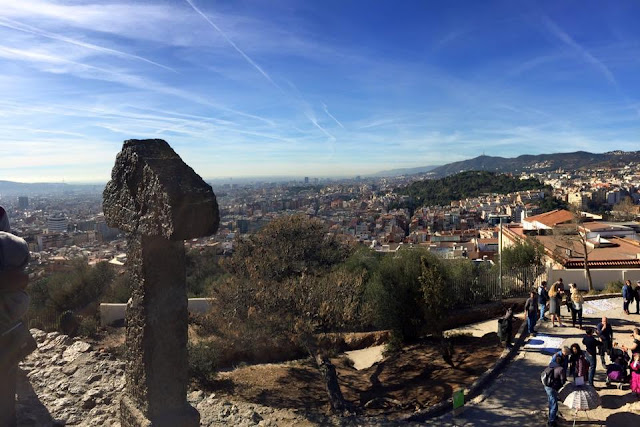Top 5 Money Saving Tips
One of the very first things that
comes to mind when most people think of studying abroad is the expensive side
of it. If your experience is anything like mine, you have had countless
discussions with your academic advisors, the study abroad office and your
family on all of the expenses to anticipate when deciding to study abroad. As
if college tuition in your home state (or country) is not pricey enough, most
students immediately worry that their dream semester or year abroad will be
impossible due to financial constraints. However, I would like to share some of
my experiences while abroad in Barcelona, Spain with you to help ease that
worry and encourage some money saving tips for possible trips in the future!
There are certainly more than
five money saving tips that I found incredibly resourceful during my five
months of studying (and traveling) abroad in Western Europe, but I'm going to
share the most "crucial" and simplest tips that you can use to ease
the financial burden of your incredible experience.
Tip #1: Regardless of your accommodation arrangements during your
semester abroad, this is one of the most important things I discovered to save
money – cooking/eating meals at your apartment, in your dorm residency or at
your home-stay will save you a significant amount of money! Home-stays in most
cities will provide you with breakfast and dinner, assuming that you will be
away at classes during lunch-time in the afternoon. Most residencies may offer
a cafeteria like meal plan or the rooms will be equipped with a small makeshift
kitchen. The apartments, as expected, come with a fully equipped kitchen and
more space to make your own meals to dine at home. I found that making trips to
the fresh markets several times a week actually saved me money in the long run
– as I bought only what I needed, stocked up on essential cooking supplies in
the get-go and had little to no waste throughout the week. I would buy healthy
snacks for breaks between my classes so I wasn't spending money at a coffee
shop or restaurant every afternoon for a drink and snack. Believe it or not, as
great of specials as places run during mid-day breaks, these expenses will add
up quickly! I would also buy healthy snacks for the airport or to have in my
bag during weekend trips. This later saved me some extra pocket money in the
long run for my weekend adventures to splurge while I was traveling to
different countries and different cities.
Tip #2: If there are places that you know your heart is set on
visiting during your time abroad, start looking up flight deals and
accommodations (hostels, Airbnb, etc.) as early as you've been accepted into
your study abroad program! I was able to book a lot of my weekend trips for
50-70% off their original price by booking them during Black Friday specials
with study abroad travel providers like Bus2alps and EuroAdventures. These
companies also run specials for Fall Semester trips during the summertime. If
you feel comfortable enough to know you may be traveling alone and later
meeting up with large groups of study abroad students from all over the globe,
this is something I would definitely recommend. It allowed me to travel so much
more than I thought my expenses would allow and I am forever grateful for the
friends I met while on these trips! You are guided by previous study abroad
students who are incredibly helpful, you'll travel with other like-minded
students and depending upon the weekend trip you book, your transportation is
included in the price! Definitely something I would look into if you're
adventurous and on a budget.
Tip #3: Take advantage of local specials! Barcelona has mid-day
lunch specials Monday-Friday which they call their "menú del día."
These lunch specials include a drink of your choice, a small first plate, a
second entrée plate and dessert of the day for a small price of between 8-13€. This is a
fantastic deal for those available between the hours of 11am-2pm because normal
entrées generally run much, much more than this alone! While these specials are
also available on weekends and holidays, they generally cost double what they
would during the week. Sitting outside on the terraces or little patios for a
mid-afternoon break from classes was such a great way to get to know my classmates.
The select menus (usually offering 2-3 choices per plate) also encouraged me to
try a lot of new and delicious local cuisine which I otherwise probably
wouldn't have ordered. Making time for little lunches and friends throughout
the day instead of burying yourself inside a quiet, empty classroom during
lunch will be worth the while, I promise! You will get to know the culture and
people much better if you're willing to immerse yourself.
 Tip #4: If you're wanting to explore but can't afford to get away
for an entire weekend (financially, academically, whatever it may be), look
into train or tram tickets online for nearby cities worth visiting! These train
tickets are often very affordable and depending upon the zoning of your metro
pass for the semester, the transportation fare may even be included in the pass
you have already purchased to get yourself to and from class! If you and a
group of friends are up for it, it's a great way to inexpensively travel as you
can pack your lunches for the day and get to know new areas in your host
country without breaking the bank.
Tip #4: If you're wanting to explore but can't afford to get away
for an entire weekend (financially, academically, whatever it may be), look
into train or tram tickets online for nearby cities worth visiting! These train
tickets are often very affordable and depending upon the zoning of your metro
pass for the semester, the transportation fare may even be included in the pass
you have already purchased to get yourself to and from class! If you and a
group of friends are up for it, it's a great way to inexpensively travel as you
can pack your lunches for the day and get to know new areas in your host
country without breaking the bank.
Tips For Traveling and Transportation Abroad
I remember one of my biggest questions or
concerns before going abroad was how exactly I was going to get around
Barcelona, Spain once I had arrived. I knew prior to my arrival that my classes
would be taught at two entirely different campuses, which I was very excited
and equally nervous about. I was worried I wouldn't have enough time – as if
the university hadn't already thought that through for all of us students. My
second concern was how I would get to and from the airport for all of the
weekend trips I had already planned, because I knew that taking a cab there and
back wouldn't be feasible for my budget. I learned that almost immediately upon
my arrival, as I took a cab to my hotel with all of my luggage once I had
arrived from the states. It was the most comfortable and secure choice for my
initial arrival, but certainly reflected that in its cost. I couldn't afford a
45€ cab fare every other weekend.
 |
| Courtney at Park Guell, Spain |
(geographically). It's very walkable, and scenic, if you have the time to commute on foot. My morning campus was an 8-minute walk from my apartment door, which made for a very easy and relaxing commute to class. My afternoon and evening campus, on the other hand, would take well over an hour to walk to - which is where the metro pass I decided to purchase certainly came in handy.
The city of Barcelona has several options for Metro
passes – a one way, a roundtrip airport ticket, a youth pass (T-JOVE), a
resident pass, and then quarterly/monthly passes. Due to the extent of my stay
and my age, I was directed to purchase the T-JOVE pass which was good for 90
days for anybody between the age of 16-26 years old for unlimited rides via
metro, bus or AVE within the city limits of Barcelona. This initial cost of
105€ paid itself off in a matter of weeks, as I was never inconvenienced by
"running out" of rides or worried that my pass wouldn't work. I was
able to take any city buses day or night, all metro stops within Barcelona, AND
roundtrip train fare to and from the airport by using my T-JOVE pass. Thus,
instead of traveling to the airport by cab, I was able to take the metro to the
airport exchange point and saved myself easily 75-90€ each trip that I took.
 |
| Sitga, Spain |
As far as weekend/extracurricular travel was
concerned, I found long-haul buses and classic European airline flights to be
my most affordable and time friendly option. Although trains generally run
high-speed in Europe and could have gotten me there in roughly the same amount
of time as flying, they often ran more expensive due to the "lack of
hassle" of airport security. To be honest, I really didn't mind the hour
long metro ride to and from the airport to look forward to and reflect on my
weekend trips. Additionally, airport security in Western Europe wasn't nearly
as miserable as my experiences here in the states.
 |
| Park Guell Spain |



0 comments:
Post a Comment